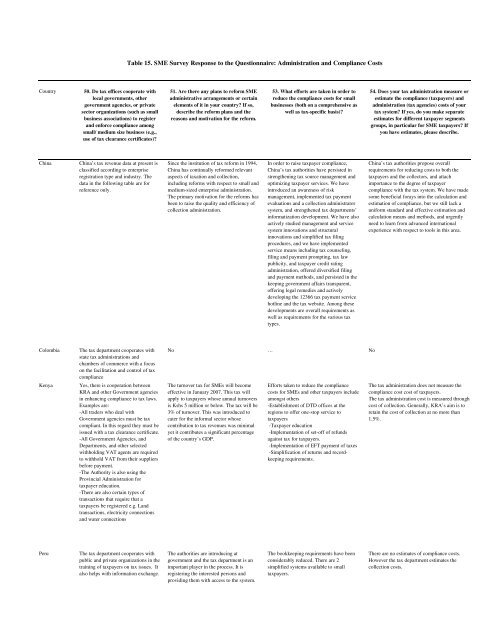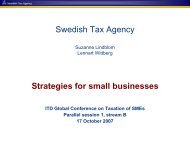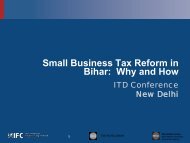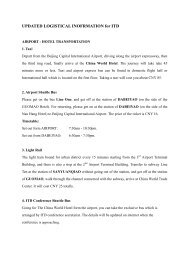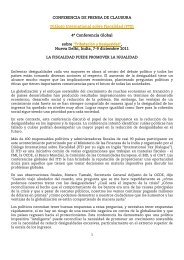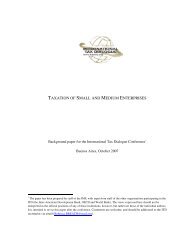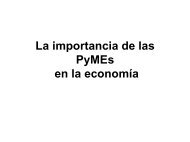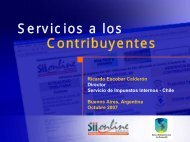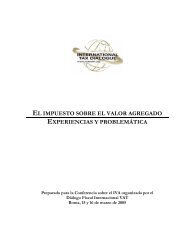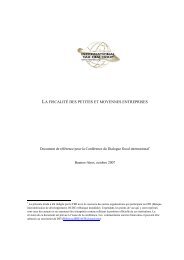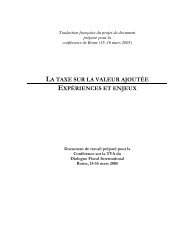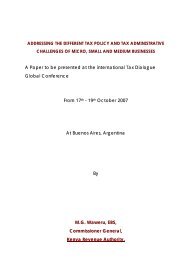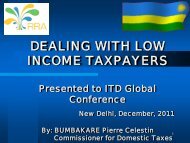PDF format - International Tax Dialogue
PDF format - International Tax Dialogue
PDF format - International Tax Dialogue
Create successful ePaper yourself
Turn your PDF publications into a flip-book with our unique Google optimized e-Paper software.
Table 15. SME Survey Response to the Questionnaire: Administration and Compliance Costs<br />
Country<br />
50. Do tax offices cooperate with<br />
local governments, other<br />
government agencies, or private<br />
sector organizations (such as small<br />
business associations) to register<br />
and enforce compliance among<br />
small/ medium size business (e.g.,<br />
use of tax clearance certificates)?<br />
51. Are there any plans to reform SME<br />
administrative arrangements or certain<br />
elements of it in your country? If so,<br />
describe the reform plans and the<br />
reasons and motivation for the reform.<br />
53. What efforts are taken in order to<br />
reduce the compliance costs for small<br />
businesses (both on a comprehensive as<br />
well as tax-specific basis)?<br />
54. Does your tax administration measure or<br />
estimate the compliance (taxpayers) and<br />
administration (tax agencies) costs of your<br />
tax system? If yes, do you make separate<br />
estimates for different taxpayer segments<br />
groups, in particular for SME taxpayers? If<br />
you have estimates, please describe.<br />
China<br />
China’s tax revenue data at present is<br />
classified according to enterprise<br />
registration type and industry. The<br />
data in the following table are for<br />
reference only.<br />
Since the institution of tax reform in 1994,<br />
China has continually reformed relevant<br />
aspects of taxation and collection,<br />
including reforms with respect to small and<br />
medium-sized enterprise administration.<br />
The primary motivation for the reforms has<br />
been to raise the quality and efficiency of<br />
collection administration.<br />
In order to raise taxpayer compliance,<br />
China’s tax authorities have persisted in<br />
strengthening tax source management and<br />
optimizing taxpayer services. We have<br />
introduced an awareness of risk<br />
management, implemented tax payment<br />
evaluations and a collection administrator<br />
system, and strengthened tax departments’<br />
in<strong>format</strong>ization development. We have also<br />
actively studied management and service<br />
system innovations and structural<br />
innovations and simplified tax filing<br />
procedures, and we have implemented<br />
service means including tax counseling,<br />
filing and payment prompting, tax law<br />
publicity, and taxpayer credit rating<br />
administration, offered diversified filing<br />
and payment methods, and persisted in the<br />
keeping government affairs transparent,<br />
offering legal remedies and actively<br />
developing the 12366 tax payment service<br />
hotline and the tax website. Among these<br />
developments are overall requirements as<br />
well as requirements for the various tax<br />
types.<br />
China’s tax authorities propose overall<br />
requirements for reducing costs to both the<br />
taxpayers and the collectors, and attach<br />
importance to the degree of taxpayer<br />
compliance with the tax system. We have made<br />
some beneficial forays into the calculation and<br />
estimation of compliance, but we still lack a<br />
uniform standard and effective estimation and<br />
calculation means and methods, and urgently<br />
need to learn from advanced international<br />
experience with respect to tools in this area.<br />
Colombia<br />
Kenya<br />
The tax department cooperates with<br />
state tax administrations and<br />
chambers of commerce with a focus<br />
on the facilitation and control of tax<br />
compliance<br />
Yes, there is cooperation between<br />
KRA and other Government agencies<br />
in enhancing compliance to tax laws.<br />
Examples are:<br />
-All traders who deal with<br />
Government agencies must be tax<br />
compliant. In this regard they must be<br />
issued with a tax clearance certificate.<br />
-All Government Agencies, and<br />
Departments, and other selected<br />
withholding VAT agents are required<br />
to withhold VAT from their suppliers<br />
before payment.<br />
-The Authority is also using the<br />
Provincial Administration for<br />
taxpayer education.<br />
-There are also certain types of<br />
transactions that require that a<br />
taxpayers be registered e.g. Land<br />
transactions, electricity connections<br />
and water connections<br />
No … No<br />
The turnover tax for SMEs will become<br />
effective in January 2007. This tax will<br />
apply to taxpayers whose annual turnovers<br />
is Kshs 5 million or below. The tax will be<br />
3% of turnover. This was introduced to<br />
cater for the informal sector whose<br />
contribution to tax revenues was minimal<br />
yet it contributes a significant percentage<br />
of the country’s GDP.<br />
Efforts taken to reduce the compliance<br />
costs for SMEs and other taxpayers include<br />
amongst others<br />
-Establishment of DTD offices at the<br />
regions to offer one-stop service to<br />
taxpayers<br />
-<strong>Tax</strong>payer education<br />
-Implementation of set-off of refunds<br />
against tax for taxpayers.<br />
-Implementation of EFT payment of taxes<br />
-Simplification of returns and recordkeeping<br />
requirements.<br />
The tax administration does not measure the<br />
compliance cost cost of taxpayers.<br />
The tax administration cost is measured through<br />
cost of collection. Generally, KRA’s aim is to<br />
retain the cost of collection at no more than<br />
1.5%.<br />
Peru<br />
The tax department cooperates with<br />
public and private organizations in the<br />
training of taxpayers on tax issues. It<br />
also helps with in<strong>format</strong>ion exchange.<br />
The authorities are introducing at<br />
government and the tax department is an<br />
important player in the process. It is<br />
registering the interested persons and<br />
providing them with access to the system.<br />
The bookkeeping requirements have been<br />
considerably reduced. There are 2<br />
simplified systems available to small<br />
taxpayers.<br />
There are no estimates of compliance costs.<br />
However the tax department estimates the<br />
collection costs.


